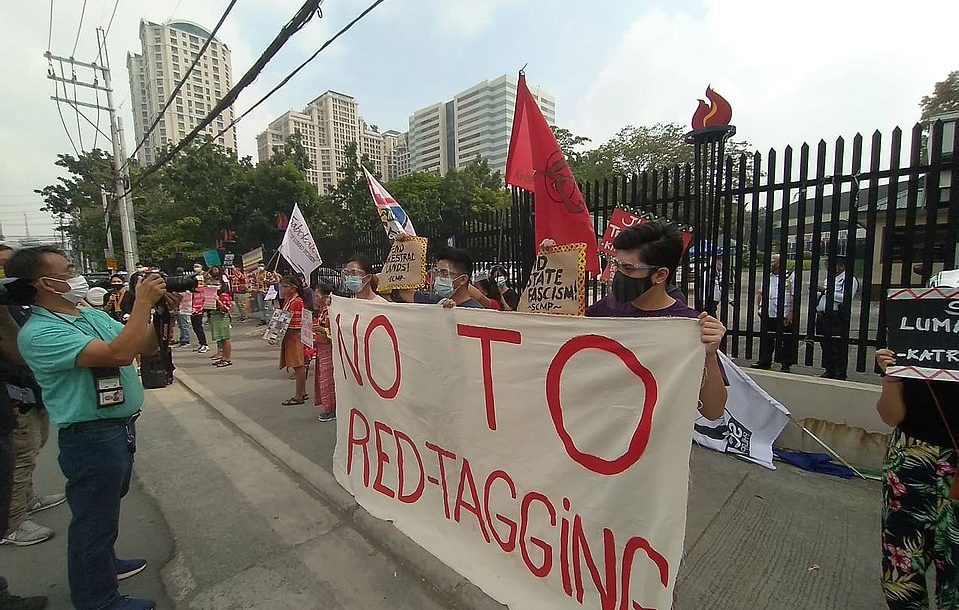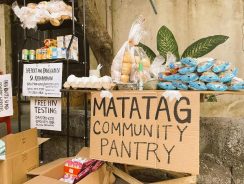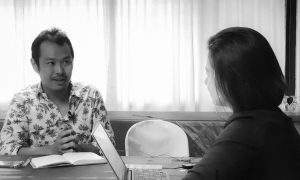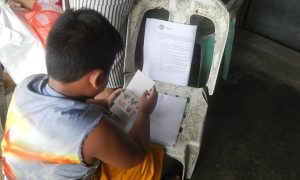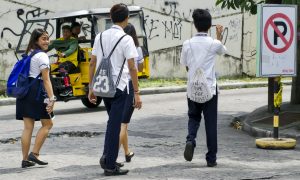It was around 9:00 pm of March 3, 2021 in Iloilo City. As human rights lawyer Angelo Karlo “AK” Guillen was walking from his car to his boarding house, he saw two men wearing ski masks run after him. Fearing them, he ran away but he tripped. The men stabbed him repeatedly and left a section of a 25-centimeter screw driver inside his left temple. They took his bag containing his laptop and a few documents, but left his cell phone, wallet and other valuables behind. Two other men riding two motorcycles arrived and fled with the assailants. Luckily, Guillen survived.
No common crime
The incident could easily be seen as a common crime, but the Integrated Bar of the Philippines, the biggest lawyers’ association in the country, labelled it a “brazen and bloody assassination attempt.” When the attack happened, 54 lawyers had already been extra-judicially killed since Rodrigo Duterte became president in June 2016. Guillen was the counsel for the Tumandok indigenous people in a high-profile case in which nine were killed as a result of a police operation in December 2020. He was one of the petitioners against the draconian Anti-Terrorism Law in the Supreme Court.
Guillen had also been “red-tagged and threatened many times,” according to the IBP. Human rights group Karapatan recounts what is perhaps the most notorious instance: in December 2018, Guillen’s photo was featured in posters plastered around Iloilo City. The posters tagged him as a member of communist-led armed rebel group New People’s Army or NPA, which has been designated as terrorist by the Philippine government. His photo appeared with photos of community activist Jory Porquia, who was extra-judicially killed in April 2020, and Atty. Cris Heredia, who survived a shooting attack in September 2019. The poster functioned as a kind of hit list.
Before the attempt on his life, Guillen wrote “Understanding Red-tagging and Repression as State Policy.” Citing a Supreme Court justice, he defined red-tagging as “the phenomenon of implicating progressive civil group leaders to heinous crime,” or the “vilification, labelling… of,” or ascribing “guilt by association” to, organisations in which said individuals and organisations are depicted as communists or communist supporters, “making them easy targets of government military or paramilitary units.” He traced it to the government’s long-running counter-insurgency program, and its widespread use to the National Task Force to End Local Communist Armed Conflict or NTF-ELCAC, a government agency created in 2018 by Duterte.
Red-tagging and human rights crisis
Red-tagging is an important facet of the human rights crisis in the Philippines, which became even more acute when Duterte was elected president. According to Karapatan, from June 2016 to August 2021, there are already 421 victims of extrajudicial killings and 504 victims of frustrated extrajudicial killings in the country — excluding the tens of thousands believed to have been killed under Duterte’s “war on drugs.” There are also 2,758 victims of illegal arrest without detention and 1,138 victims of illegal arrest with detention. The majority of these victims have been red-tagged as individuals, belong to organisations that have been red-tagged, or both.
Red-tagging has received much critical domestic and international attention in recent years. The United Nations Office of the High Commissioner for Human Rights states that “human rights advocacy is routinely equated with insurgency and the focus diverted to discrediting the messengers rather than examining the substance of the message… This has muddied the space for debate, disagreement and for challenging State institutions and policies.”
Human Rights Watch says that the practice “is rapidly shrinking the space for peaceful activism.” The International Commission of Jurists asserts that the government should stop labelling rights defenders as terrorists. It says that accusations of terrorism “must be pursued through the rule of law,” use “cognizable charges,” comply with due process, and uphold “the right to a fair trial by a competent independent and impartial court.”
A human rights violation
A recent development in public discussions of red-tagging is a piece of legislation proposed by progressive lawmakers in the House of Representatives that aims to criminalise the act. The explanatory note accompanying the Anti-Red-tagging Act of 2021 states that the practice must be criminalised because it involves the use of public funds and has “an injurious and irreversible impact” on victims. The bill proposes imprisonment and dismissal from government post as punishment and, if the victim is killed or disappeared, being held accountable for murder or enforced disappearance.
In a similar vein, in resolutions in June and December 2021, the Cordillera regional office of the government’s Commission on Human Rights (CHR) asserted that red-tagging should be considered a human rights violation.
CHR-Cordillera claimed that red-tagging violates the human rights provisions of the 1987 Philippine Constitution, which guarantees the freedom of expression and “the right… peaceably to assemble,” to “petition the government for redress of grievances,” and to form organisations. It also cited the International Covenant on Civil and Political Rights (ICCPR) and the Universal Declaration of Human Rights, which uphold similar rights as well as the basic right to equal protection of the law—which it called “a cornerstone of human rights.”
Rights violated
Guillen’s paper also contributes to this discussion. Analysing red-tagging from a political perspective, Guillen enumerated the government’s objectives for carrying out the act, which can be used to identify other rights that are violated by red-tagging. According to him, these objectives are (1) to “present the public with a narrative that portrays the victim as an acceptable target of attack,” (2) “dispense with the need for a thorough investigation into the human rights violations committed,” (3) “shield the perpetrators from accountability,” and (4) “discourage public support or participation in organisations subjected to red-tagging.”
The Duterte government’s pursuit of the first and fourth objectives mentioned by Guillen is most visible at present, just weeks before the Philippines’ 2022 elections. Responding to the opposition’s massive campaign rallies, allies of the Duterte government accused opposition presidential candidate and incumbent vice-president Leni Robredo of conspiring with the Communists who are allegedly bringing in the crowds.
In response, a broad array of personalities from the country’s middle classes released a statement decrying these accusations. Saying that red-tagging has no place in Philippine politics, the signatories claimed that the recent incidents point to “a desperate ploy to undermine the clamour for a Robredo presidency.” Apart from reiterating that red-tagging exposes those accused to various dangers, the statement says that it “is a portent of a brutal election-related crackdown on opposition forces.”
Community pantries as everyday socialism
Aside from critiquing state inefficiency, I think community pantries are telling us something more ideological.
The title of the statement is exact as it is suggestive: “Red-tagging is disinformation enabling fraud and violence.” International law researcher Richard Wingfield enumerates the human rights that are violated by disinformation. One is the right to freedom from unlawful attacks upon one’s honour and reputation, contained in the ICCPR.
He also mentions the right to free and fair elections and the right to non-discrimination, both contained in the ICCPR and most relevant in the case of the Philippines’ 2022 elections. Other rights that are violated by disinformation, a phenomenon that has recently become a focus of research in the country, can also be included.
In light of the Duterte government’s red-tagging of universities and bookstores, and banning of certain books from public libraries, many writers, intellectuals and academics have raised the issue of academic freedom. While not named as such in founding documents of international human rights, academic freedom is supported by the freedom of opinion, expression and belief also stated in the ICCPR.
Fighting back, localising rights
Attempts to criminalise red-tagging and declare it a human rights violation show how citizens and civil society in the Philippines are fighting back in the legal sphere against an instrument of repression used by a government that has become an avatar of democratic decline in the world. These are comparable to attempts to push back against Narendra Modi’s Hindu nationalism against India’s Muslims, and Jair Bolsonaro’s efforts to decimate the population of Brazil’s indigenous peoples.
In these efforts, citizens and civil society organizations in the Philippines are summoning international human rights to respond to a particular need—one that is crucial in the overall state of human rights and democracy in the country. This process—“the construction and defence of universal standards which must at the same time be adapted to local contexts,” in the words of sociologist Kate Nash in her 2015 book The Political Sociology of Human Rights—is an inevitable and usual process in the discourse of human rights.
It is also an urgent need, as red-tagging has already contributed to the loss of many lives and still threatens many others—including those, like Guillen’s, that despite grave attacks, continue to be lived in the service of the marginalised.
 Facebook
Facebook  Twitter
Twitter  Soundcloud
Soundcloud  Youtube
Youtube  Rss
Rss 